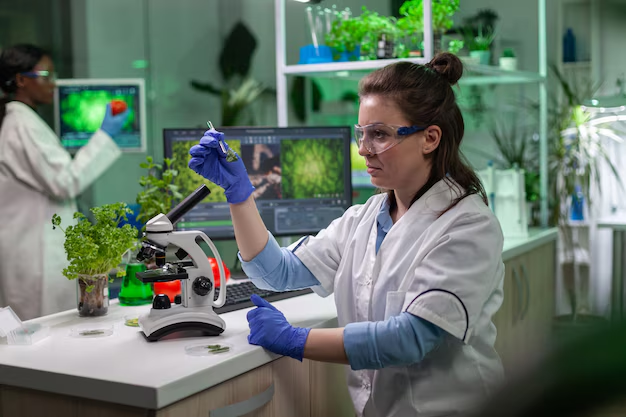Exploring Careers in Genetics: Your Guide to Becoming a Geneticist
Have you ever pondered the secrets locked within your DNA or wondered how geneticists unravel the mysteries of heredity and evolution? The field of genetics is an ever-evolving landscape of discovery and innovation, influencing everything from medicine to agriculture. If you're passionate about science and intrigued by the microscopic wonders of life, a career as a geneticist might be your calling. This comprehensive guide explores what it takes to become a geneticist, the different roles available, industry trends, and much more.
The Fascination of Genetics: Setting the Stage
Genetics is literally in our DNA—the study of genes, genetic variation, and heredity in living organisms. It's a field that has captured human curiosity for generations, shaping our understanding of biological processes. Whether advancing medicine through genetic research or enhancing crop yields through genetic engineering, the work of geneticists touches countless facets of everyday life.
Why Choose a Career in Genetics?
Impact on Society: Genetic discoveries can lead to breakthroughs in treating genetic disorders, advancing cancer treatments, and developing sustainable agricultural practices.
Diverse Opportunities: The range of career paths in genetics is vast, spanning academic research, clinical genetics, biotechnology, and even science communication.
Constant Innovation: As new technologies emerge, geneticists are at the forefront of scientific discovery, making this a dynamic and intellectually stimulating profession.
Core Skills for Aspiring Geneticists
To excel as a geneticist, a solid foundation in several core skills and attributes is essential:
- Analytical Skills: The ability to analyze data sets and interpret complex patterns.
- Attention to Detail: Critical for conducting precise experiments and avoiding errors.
- Problem-Solving Skills: Essential for overcoming research challenges and innovating solutions.
- Communication Skills: For collaborations and the dissemination of research findings.
Educational Pathway to Genetics
A career in genetics typically begins with a strong educational foundation. Let’s delve into the steps and academic pathways that guide aspiring geneticists toward their goals.
Bachelor’s Degree: Laying the Groundwork
Most geneticists start with a bachelor’s degree in genetics, biology, or a related field. Key subjects covered during this stage include molecular biology, biochemistry, genetics, and statistics.
Tips for Aspiring Students:
- Participate in lab internships or student research projects to gain hands-on experience.
- Consider courses in bioinformatics and computational biology as these skills are increasingly in demand.
Postgraduate Education: Deepening Knowledge
A master’s degree or PhD is often necessary for advanced positions in research and academia. This is where students specialize in areas such as human genetics, plant genetics, or microbial genetics.
Graduate School Insights:
- Pursue research opportunities to develop expertise in specific genetic fields.
- Build a professional network by attending conferences and interacting with peers and professors.
Licensing and Certifications
In some regions, geneticists, particularly those working in clinical settings, may require additional licenses or certifications. These validate their expertise and ability to conduct genetic testing or counseling.
Career Pathways in Genetics
Now that we've established the educational steps, let's explore the diverse career pathways available to geneticists.
Research Geneticists: Pioneering Discoveries
Research geneticists work in academic or industrial settings, focusing on experiments and studies that lead to new genetic discoveries.
Common Employers: Universities, government research institutions, private biotech firms.
Clinical Geneticists: Bridging Science and Medicine
These professionals work in healthcare, diagnosing and treating genetic disorders. Clinical geneticists play a critical role in patient care, offering genetic counseling and directing medical treatments.
Work Environments: Hospitals, clinics, specialized medical labs.
Genetic Counselors: Guiding Patients
Genetic counselors merge genetic expertise with communication skills to provide individuals and families with information about genetic conditions.
Biotechnology and Pharmaceutical Sector
Geneticists in this sector contribute to the development of new drugs, agricultural products, and biotechnology advancements.
Key Areas:
- Gene Editing: Utilizing technologies like CRISPR to modify genes.
- Genomic Sequencing: Analyzing DNA sequences to aid in the development of personalized medicine.
Agricultural Geneticists: Innovating for Sustainability
These geneticists work to improve plant and animal species, enhancing resistance to pests and environmental conditions, or increasing yields.
Noteworthy Techniques: Crossbreeding, genetic modification, marker-assisted selection.
Trends Shaping the Future of Genetics
The field of genetics is rapidly evolving, with several trends influencing its future trajectory. Understanding these can offer insights into where the industry is headed.
Technological Advancements in Genetics
AI and Machine Learning: Transforming data analysis and predictive models in genetic research.
Precision Medicine: Tailoring medical treatments based on individual genetic profiles.
CRISPR and Gene Editing: Opening new frontiers in treating genetic disorders and improving crop resilience.
Ethical and Social Considerations
As genetics advances, ethical questions around genetic modification, data privacy, and genetic testing are more prominent.
Summary of Key Insights and Tips for Aspiring Geneticists
🔍 Explore All Fields: Gain exposure to various areas of genetics to find your passion.
📚 Stay Informed: Technologies and trends in genetics are ever-changing. Continuous learning is essential.
🤝 Network Professionally: Connections with mentors and peers can open doors to opportunities and collaborations.
🎓 Educational Investment: Higher academic qualifications can pave the way for advanced roles and specialized research.
By diving into the world of genetics, you're stepping into a field full of promise and potential, where every discovery can make a meaningful difference. Whether you're at the start of your educational journey or considering a career shift, the realm of genetics offers a rich tapestry of opportunities awaiting exploration. Pursue your curiosity, and you might find yourself at the forefront of the next groundbreaking genetic discovery.

Related Topics
- A Comprehensive Guide To Cleaning Jobs
- A Comprehensive Guide To Event Planner Jobs
- A Comprehensive Guide To Graphic Design Jobs
- A Comprehensive Guide To IT Jobs: Exploring Opportunities Within The Tech Space
- A Comprehensive Guide To Journalist Jobs
- A Comprehensive Guide To Kindergarten Teacher Jobs
- A Comprehensive Guide To Librarian Jobs: Opportunities, Requirements, And Potential Earnings
- A Comprehensive Guide To Navigating LinkedIn Jobs
- A Comprehensive Guide To Pharmacy Jobs: An Uncharted Path To a Promising Career
- A Comprehensive Guide To Photographer Jobs
